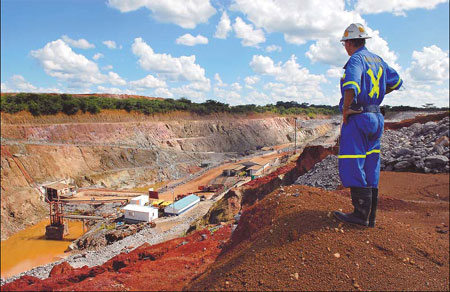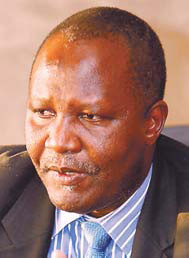Economy
Zambia eyes Chinese funds for power plant
By Andrew Moody (China Daily)
Updated: 2010-09-15 09:31
 |
Large Medium Small |
|
 |
|
A mine supervisor overlooks Metorox's Chibuluma copper mine, near Kitwe, Zambia. Chinese investment in Zambia has begun to diversify from its traditional focus on the copper industry. [Naashon Zalk / Bloomberg] |
Sinohydro may join forces with Zesco on $1.5b Kafue Gorge project
BEIJING - Felix Mutati, Zambia's trade minister, said he was hopeful of finalizing Chinese funding for a new $1.5 billion power station in the southern African country.
The leading Zambian politician spoke following talks in Beijing with senior figures from Sinohydro Corporation.
It was revealed last month that the Chinese State-owned company is set to be part of a joint venture with Zesco Corporation, Zambia's leading power utility, to build the new 600-megawatt Kafue Gorge Lower power plant.
"There are a lot of things that still need to be done. We need to decide on the policy and legal framework," Mutati said.
"These are the steps we need to go back and do. The negotiation will take a little longer before we get the paperwork agreed," he added.
|
 |
|
Felix Mutati, Zambia's trade minister, says China is playing a significant role in his nation's economic development. |
Sinohydro is already engaged in building a $450 million extension of the Karibu North Bank power station, creating a further capacity of 360 mW.
Mutati, who is Zambia's minister of commerce, trade and industry, was speaking at the Beijing American Club prior to addressing a meeting of the Association of Certified Chartered Accountants (ACCA).
He said the Chinese investment was vital to the development of the economy since the country lacked funding of its own to build power capacity.
"That level of financial resource takes a long time to find. It can take five or six years to build a power station and by the time you build it, you find it is inadequate for your needs. We are constrained by our ability to find the financial resources," he said.
China has had a long history of involvement in Zambia.
After a meeting in Beijing between then Zambian President Kenneth Kaunda, Tanzanian President Julius Nyerere and Chairman Mao Zedong in the 1960s, China helped fund the 1,800-km Tazara railway line between the two countries.
This enabled Zambia to export its copper without going through unfriendly neighboring countries.
Since 2000, trade has shot up between Zambia and China, with the African country's exports increasing from around $20 million to around $900 million last year. China's exports to Zambia in 2009, mainly machinery and pharmaceuticals, were worth around $100 million.
China's involvement in Zambia has mainly been in the copper industry, where Chinese investment accounts for up to 20 percent of Zambia's domestic capacity.
Around 55 percent of the Zambian economy is dependent on mineral resources, mainly copper.
Following a meeting between then Zambian President Levy Mwanawasa and Chinese President Hu Jintao in 2006, China agreed to invest $900 million in special economic zones.
The first of these at Chambishi has 13 Chinese-owned companies, mainly engaged in copper processing. The companies employ 6,000 people, of which only 150 are Chinese.
Mutati also had meetings in Beijing with senior figures from the State-owned China Nonferrous Metal Company (CNMC) about securing an additional $100 million of funding to build a second zone, the Lusaka South Sub Zone, on which work is expected to start next year.
"They indicated to us that they will be able to procure the extra money in order to finish the zone," he said.
Rebalancing economy
He rejected perceptions in the West that China's involvement in Africa was exploitative.
He said Zambia was typical of many African countries as it still failed to keep up with the BRIC (Brazil, Russia, India and China) nations.
"I think there are a number of reasons why Africa continues to lag behind. We tend to be primarily exporters of commodities which are very vulnerable to price shocks," he said.
Mutati added China's investment helps lessen this vulnerability by investing in higher value added processes.
He said the wealth generated by the economic zones had fuelled Zambia's construction and tourism sectors.
"Higher standards of living in the economic zones mean that people can afford to buy houses" and this is promoting the construction industry, he said.
"I would say that China has been significant, if not central, to the development of the economy."
Mutati, the only fellow of the ACCA in the Zambian cabinet, said the subject of accountancy had played a key role in his life.
"I think accountancy gives you the space to look at issues and in the pursuance of your job and to be as concerned about social morality as commercial aspects," Mutati added.




